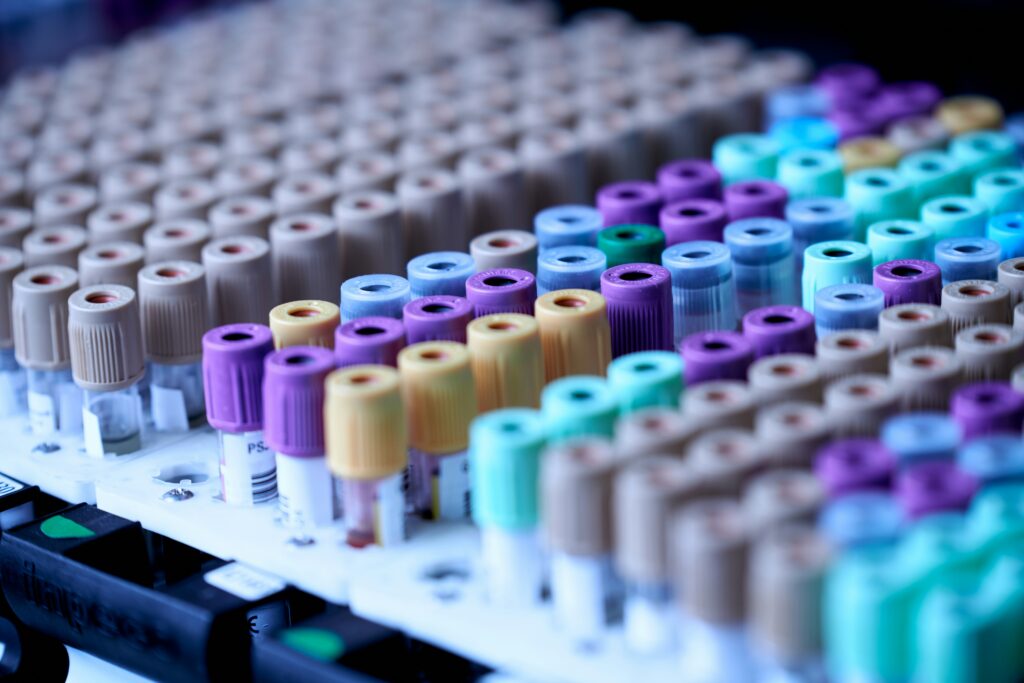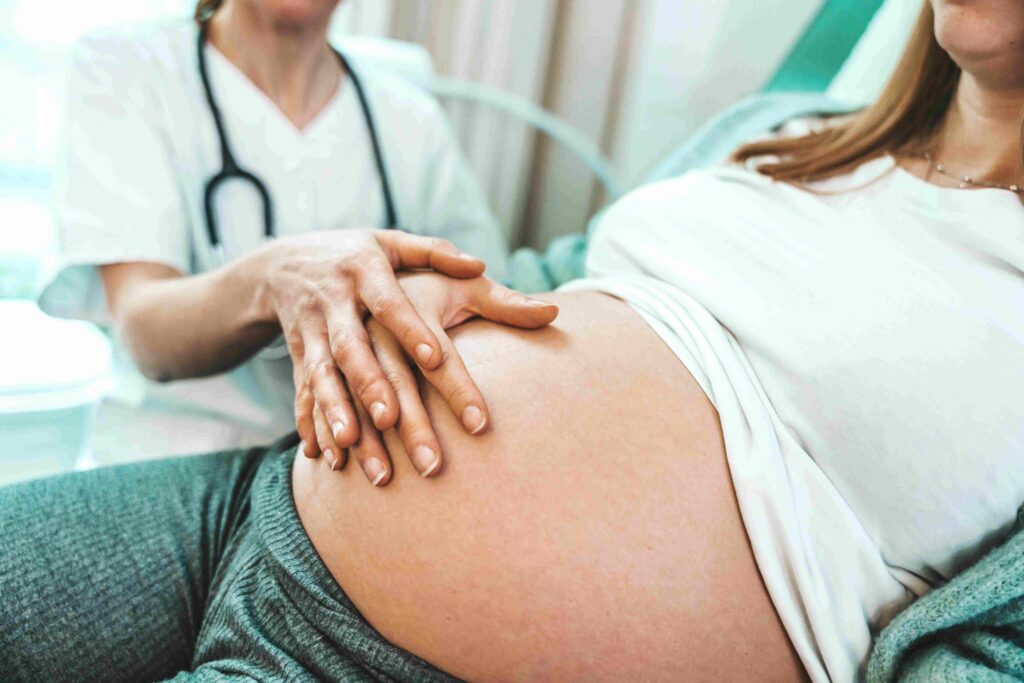At Klinik Casabrina, we understand that pregnancy can be an exciting and sometimes anxious time for expectant parents. That’s why we’re dedicated to providing advanced prenatal care options to ensure the health and well-being of both mother and baby.
We offer two options for prenatal screenings as part of our antenatal care: Non-Invasive Prenatal Testing (NIPT) and Non-Invasive Chromosomal Copy Number Variation (NICC). Both are advanced screening methods that offer valuable insights into the genetic health of the fetus with a simple blood test.


NIPT, or Non-Invasive Prenatal Testing, is a cutting-edge screening test that examines the fetal DNA present in the mother’s blood. This test can detect the risk of certain chromosomal abnormalities, such as Down syndrome (Trisomy 21), Edwards syndrome (Trisomy 18), and Patau syndrome (Trisomy 13), as well as abnormalities in the number of sex chromosomes (such as Turner syndrome or Klinefelter syndrome).
NICC, or Non-Invasive Chromosome Check, is a much newer and less established prenatal screening option similar to NIPT. It’s a blood test that specifically targets chromosomal copy number variations (CNVs) and microdeletion syndromes. Unlike NIPT, NICC is designed to detect a broader range of genetic abnormalities. It analyses cell-free fetal DNA in the maternal bloodstream to identify deletions, duplications, or other structural variations in specific chromosomal regions associated with genetic disorders.
Both tests do this by measuring the amount of cell-free fetal DNA (cffDNA) in the mother’s blood, which enters the bloodstream from the placenta during pregnancy. NIPT utilises this fetal DNA to analyse specific chromosomal regions for any abnormalities. This is a non-invasive procedure, meaning it carries no risk to the fetus or mother. A simple blood sample from the mother is all that’s needed to conduct the test.

NIPT boasts high levels of accuracy in detecting common chromosomal abnormalities, with a low rate of false positives.

Unlike traditional invasive prenatal tests, like chorionic villus sampling (CVS), NIPT does not pose any risk of miscarriage or harm to the fetus.

NIPT can be performed as early as 9-10 weeks into the pregnancy, providing expectant parents with timely information about their baby's health.

Knowing whether your baby is at risk for certain genetic conditions can offer reassurance and help parents prepare for any necessary medical or support services.

It’s important to note that while NIPT and NICC are highly accurate screening tests, they are not diagnostic tests. Positive results should be confirmed with further diagnostic testing, such as amniocentesis or chorionic villus sampling (CVS), to provide a definitive diagnosis. Additionally, NIPT and NICC may not be suitable for all pregnancies, so it’s essential to discuss the options with your doctor here at Klinik Casabrina Senawang to determine the most appropriate screening strategy based on individual circumstances and preferences.
NIPT tests and NICC tests are recommended for pregnant women who fall into one or more of the following categories:
Women of Advanced Maternal Age: Pregnant individuals who are 35 years old or older have a higher risk of having a baby with chromosomal abnormalities such as Down syndrome (Trisomy 21), making them potential candidates for NIPT and NICC.
Women with Positive Screening Results: Pregnant individuals who have received positive results from other prenatal screening tests, such as first-trimester combined screening or maternal serum screening, may opt for NIPT or NICC to obtain further information and clarify their risk.
Women with a Previous Pregnancy Affected by Chromosomal Abnormalities: Pregnant individuals who have previously had a pregnancy affected by chromosomal abnormalities may choose NIPT or NICC for early detection and planning in subsequent pregnancies.
Known Genetic Conditions or Family History: Pregnant individuals with known genetic conditions or a family history of chromosomal abnormalities may consider NIPT or NICC for additional reassurance and planning.
Before undergoing NIPT, expectant parents will typically receive genetic counselling to discuss the test’s purpose, benefits, and limitations.
A small blood sample will be collected from the mother’s arm using a standard venipuncture procedure. This process is quick and relatively painless.
The blood sample will be sent to our expert lab, where highly trained technicians will extract and analyse the fetal DNA.
Results are usually available within 7-10 days. A healthcare provider will discuss the findings with parents and provide appropriate guidance.
| Common Diseases | Sensitivity¹ | Specificity² | PPV (Positive Predictive Value) |
|---|---|---|---|
| Down syndrome | 99% | 99% | 80-95% |
| Edwards syndrome | 98% | 99% | 70-85% |
| Patau syndrome | 99% | 99% | 50-80% |
| Sex chromosome abnormalities | 95-99% | 99% | 80-95% |
¹Sensitivity refers to the ability of the NIPT test to correctly identify individuals who have the condition (true positive rate). It indicates the percentage of affected pregnancies that are correctly identified as positive by the NIPT. Higher sensitivity values indicate better performance in detecting the condition when it is present.
²Specificity refers to the ability of the NIPT test to correctly identify individuals who do not have the condition (true negative rate). It indicates the percentage of unaffected pregnancies that are correctly identified as negative by the NIPT. Higher specificity values indicate better performance in correctly ruling out the condition when it is not present.
A genetic disorder caused by the presence of an extra copy of chromosome 21, resulting in developmental delays, intellectual disability, and distinct physical features such as slanted eyes and a flattened face.
Also known as Trisomy 18, it is a chromosomal disorder caused by an extra copy of chromosome 18. Individuals with Edwards syndrome often have severe developmental delays, heart defects, and characteristic physical abnormalities such as clenched fists and overlapping fingers.
Also known as Trisomy 13, it is a chromosomal disorder caused by an extra copy of chromosome 13. Patau syndrome is characterised by severe intellectual disability, heart defects, and physical abnormalities such as cleft lip and palate, extra fingers or toes, and brain abnormalities.
A genetic condition in males caused by the presence of an extra X chromosome, resulting in infertility, underdeveloped testes, and may lead to reduced muscle mass, tall stature, and learning disabilities.
A genetic condition in females characterised by the presence of an extra X chromosome, resulting in variable symptoms such as tall stature, learning disabilities, delayed development, and may increase the risk of certain health conditions such as autoimmune disorders and behavioural issues.
Please note that the values provided for sensitivity, specificity, and PPV are approximate ranges and may vary slightly depending on the specific test used and the population being studied. Additionally, PPV can vary based on factors such as maternal age and prevalence of the condition in the population. Always consult with a healthcare professional for the most accurate and up-to-date information regarding prenatal screening tests.

Scheduling an appointment for your antenatal checkup is easy. Contact our friendly staff via phone or email to book your consultation. We strive to accommodate your schedule and ensure timely care.
Klinik Casabrina is a women’s and children’s healthcare clinic in Seremban, Malaysia. We provide specialized services such as gynecology check-ups, antenatal and postnatal care, and more.
Copyright © 2023 CASABRINA MEDICAL SDN BHD 202201045614 (1491311-M). All Rights Reserved | HTML Sitemap | Privacy Policy | Created by Hypercharge.